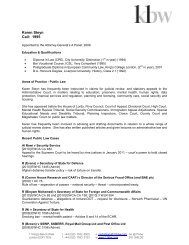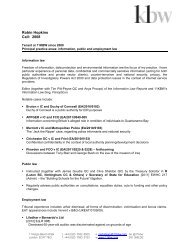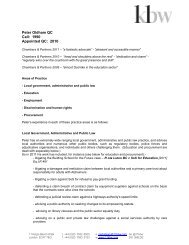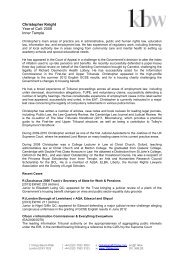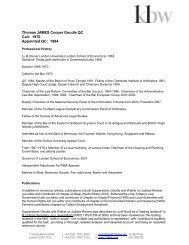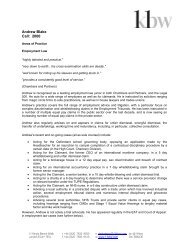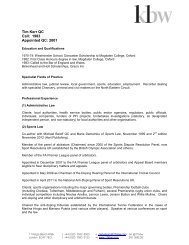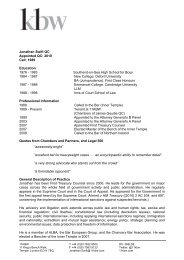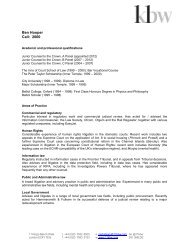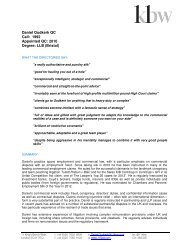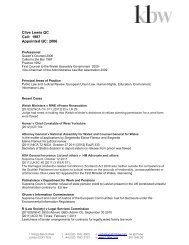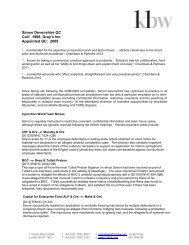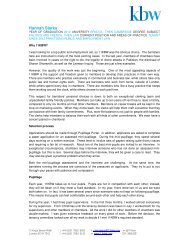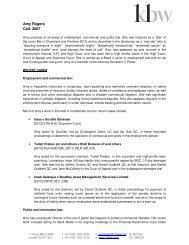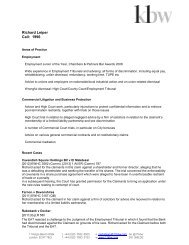THE PUBLIC SECTOR EQUALITY DUTY Joanne Clement - 11kbw
THE PUBLIC SECTOR EQUALITY DUTY Joanne Clement - 11kbw
THE PUBLIC SECTOR EQUALITY DUTY Joanne Clement - 11kbw
Create successful ePaper yourself
Turn your PDF publications into a flip-book with our unique Google optimized e-Paper software.
(5) Fifthly, the duty is a continuing one;<br />
(6) Sixthly, it is good practice to keep an adequate record showing that they had<br />
actually considered their equality duties and pondered relevant questions. If<br />
records are not kept it may make it more difficult, evidentially, for a public<br />
authority to persuade a court that it has fulfilled the duty.<br />
10. The principles set out in Brown have been approved by the Court of Appeal in R<br />
(Domb) v London Borough of Hammersmith and Fulham [2009] EWCA Civ 941. A<br />
number of other relevant propositions can be derived from other cases. The current<br />
position of the law was helpfully summarised by Kenneth Parker J in R (JG and MB) v<br />
Lancashire County Council [2011] EWHC 2295 (Admin); [2011] BLGR 909 at [43]-<br />
[44] as follows:<br />
“43. A number of principles emerge as follows:<br />
i) The statutory duty under Section 49A DDA is not one to<br />
achieve a particular substantive result (whether to promote<br />
equality or otherwise) but to have “due regard” to the need to<br />
achieve these goals. Due regard is regard that “is appropriate<br />
in all the circumstances” (Baker at para 31 by Dyson LJ (as he<br />
then was)).<br />
ii) The public authority must also pay regard to any<br />
countervailing factors which, in the context of the function<br />
being exercised, it is proper and reasonable for the public<br />
authority to consider. The weight to be given to the<br />
countervailing factors is a matter for the public authority, not<br />
the court, unless the assessment by the public authority is<br />
unreasonable or irrational (Baker at para 34, Brown at para<br />
82).<br />
iii) A failure to make explicit reference to the statute does not<br />
show that the duty has not been performed (Brown at para<br />
93). It is immaterial whether or not the decision-maker was<br />
even aware of the duty provided that in substance he had due<br />
regard to the matters specified in it (Baker at paras 36, 37, 40<br />
and 46).<br />
iv) There is no obligation in the DDA to carry out a formal EIA<br />
(Brown at para 89) although such an EIA is a helpful way of<br />
demonstrating that the statutory duty has been complied with.<br />
44. [Counsel for the claimants] laid emphasis on a number of<br />
other propositions that can be derived from the case law as<br />
follows:<br />
i) Due regard must be given “before and at the time that a<br />
particular policy that will or might affect disabled people is<br />
being considered by the public authority in question” (Brown<br />
at para 91).<br />
ii) Due regard to the duty must be “an essential preliminary” to<br />
any important policy decision not a “rearguard action following<br />
<strong>Joanne</strong> <strong>Clement</strong>, 11KBW<br />
t. 020 7632 8500 e. <strong>Joanne</strong>.<strong>Clement</strong>@<strong>11kbw</strong>.com<br />
4



